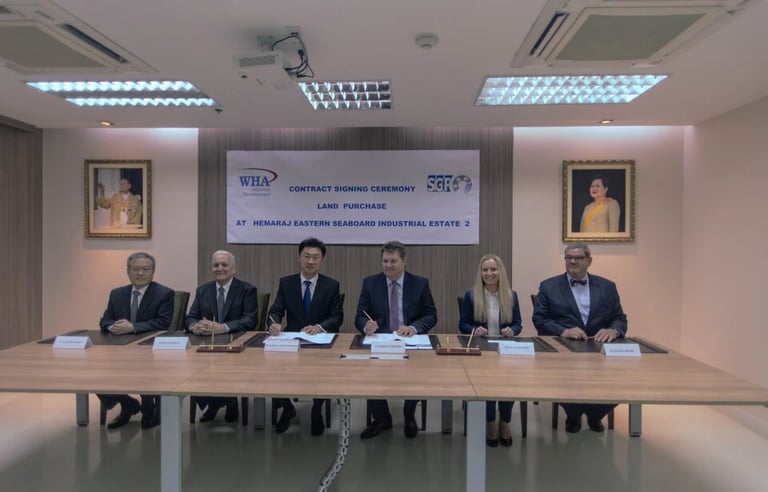COMPANY FORMATION IN THAILAND
SETTING UP A COMPANY IN THAILAND
SETTING UP A COMPANY IN THAILAND IS QUITE EASY, EVEN FOR FOREIGNERS
In principle, foreigners, both natural and juristic persons, can easily set up a wholly-foreign-owned enterprise (WHFOE). The most common legal form for a business in Thailand is the “Company Limited”. However, more important than the legal form is the “form of activity” or “what the company is allowed to do”. The Foreign Business Act imposes strict limits here.
Yet these limits can be overcome. Sanet’s legal team see themselves as “Deal Makers” not “Deal Breakers”. We do not explain why your plans cannot be implemented, but rather we clarify exactly how to implement them in a legally sound manner.




SETTING UP A COMPANY IN THAILAND: HOW TO DO IT WITH SANET LEGAL & ACCOUNTANCY IN BANGKOK
With a German and an Austrian lawyer as well as a local Thai legal team, Sanet Legal is the perfect point of contact for your Thai business setup. Our team will guide you step by step through the process of setting up a company in Thailand.
Step 1: Define your Business Case
Before we get into the formal registration of a company in Thailand, let’s get to know your intended business model. A company is quickly set up, but the proud owners are often surprised after forming a company in Thailand that their firm is not allowed to take up any active activities. This is because the “Thai Foreign Business Act” prohibits companies with a majority of Thai shareholders from offering all types of trading as well as providing services. We will discuss with you in advance which activities your “Company Limited” or which additional permits you need to apply for.
Step 2: Define your Company Structure
Our lawyers will then carefully go through the formal requirements for the formation of the company with you. These include the following:
How high should the share capital be, which for foreign owned entities usually has to be at least 2 million Thai Baht (approx. EUR 50,000)?
How high should the value of each share be and should only “ordinary” shares or also “preferred” shares be registered, which grant a higher voting share or a higher profit share?
Who are the at least two shareholders that a Company Limited must include? What percentage of shares should they hold?
What address should your company be registered at?
Should the Articles of Association comply with the Thai standard or should special regulations be included?
What business objectives should be registered and what business activities will this cover in the future?
Who should be the Directors? We make sure that one of the Directors should reside in Thailand and being a foreigner, therefore needs a visa and a work permit.
Should the Directors be authorized to sign jointly or individually?
Who should be the company’s statutory first auditor?
Step 3: We will register your company with DBD (Department of Business Development)
Sanet supports on investing in Thailand for foreigners with special services to ensure a speedy process:
Basically, the company must first be registered by two “Promoters”, who should preferably be local and must be natural persons. Both must each hold a share in the company, at least temporarily. If necessary, Sanet provides one or both promoters, who will then transfer their share back to the foreign shareholders after registration.
If, as is usually the case, there is not yet a rental agreement for the future company address, Sanet will provide this address until the company is legally registered or for an agreed transitional period.
If the newly established company does not have a local Director, Sanet can also help with this. We will provide an additional Local Director together with the Directors appointed by the investor when the company was incorporated in Thailand.
Sanet organizes the online communication with the DBD for you, so that your identification as a Director can be done online and without a personal visit.
The Accounting Department of Sanet Legal & Accountancy will arrange the auditor for the mandatory initial audit upon request.
Step 4: We organize your operational start
To get started, there are still a few practical activities that should be carried out in direct connection with the company formation:
Tax and VAT (Value Added Tax) registration with the Revenue Department. A tax declaration, or even a “zero declaration” if necessary and must be submitted within the first month of incorporation. This too can be done by our law firm on request.
It is important to open a bank account with a Thai Commercial Bank. Thanks to our good business relationships with several banks, this usually very complex procedure is made so much easier for the client that we can prepare all the documents, but the authorized bank representatives need then to come to the bank with us personally to sign.
Usually, the online banking applications are also submitted at the same time so that they can access their account from abroad and carry out transactions after a processing period.
We also advise and assist you with the final transfer of the capital, which is usually to be paid in in foreign currency and from abroad. This ensures that this capital is later recognized as investment capital in the event of an investment promotion.
The timeline – no need to worry about it with Sanet
Sanet Legal & Accountancy, the German legal consultancy in Bangkok, ensures that the entire process is handled swiftly. As soon as we have received the information on step 2 from our clients, our Thai colleagues ensure that it is quickly processed by the authorities. As a rule, the process is then completed after 5-10 days.
Of course, we rely on the cooperation of our clients. For example, it is of great benefit if the Board of Directors’ resolution prepared by Sanet and their Power of Attorney to open an account are available quickly after registration.
SANET GROUP - THE ONE-STOP-SERVICE FOR YOUR THAILAND BUSINESS SET-UP
Of course, with every Company Formation in Thailand, there are a number of legally relevant tasks that are closely or further related to the Thai Company Formation. Here are some examples:


Joint Venture Agreements
It is not uncommon for foreign companies to cooperate with a Thai majority partner in order to be exempt from all restrictions with regard to trade and services through such a majority Thai Joint Venture. As a Thai majority joint venture, they have the same rights as any other Thai company. Sanet Legal & Accounting not only advises together with the management consultancy of Sanet Asian Advisors on the corporate structuring of such contracts. In the case of an interesting business plan, Sanet as a Thai company also has the ability to take a minority stake, which in case of doubt can work towards a balance of interests between the foreign and Thai joint venture partners.
Accounting & Payroll
Under the guidance of an experienced author, we manage your accounting according to the Thai law. We provide you with your monthly income statement, balance sheet, the status of your receivables and other evaluations as agreed. Of course, this also includes processing your payroll accounting with all social security contributions and reports required by the authorities.
By the way: Our colleagues at Sanet Manpower, our Sanet Group’s recruitment agency in Thailand, will be happy to find the right management personnel for you.
Foreign Business License (FBL)
While companies with foreign ownership are not subject to trading restrictions if they contribute a paid-in capital of 100 million or 200 million THB (depending on the trading form), smaller companies trading in goods, for example, require a Foreign Business License from the Ministry of Commerce. Sanet will guide you through the application process if together with us you come to the conclusion that this license is the right path for you and your company.
The Business Unit
For many companies, the application process up to the licensing of trade and services interferes with the execution of their business and the provision of a technical after-sales service. Other companies want to first test the market before investing directly in a relatively expensive enterprise.
BOI Investment Promotion
Everyone is free to produce in Thailand and to sell or export his products on the market. However, investment incentives from the BOI help you in return for your investment to be exempt from corporate income tax for up to 13 years in full or subsequently in half. Here too, Sanet lawyers will help you through the application process and with the preparation of the regulated business plan together with the management consultants of Sanet Asian Advisors.
As a solution, Sanet Trade & Services offers contractual support for their customers through Business Units set up exclusively for these tasks with dedicated personnel assigned to one client at a time only. The exciting thing about this interim solution is that it waives margins and commissions entirely but looks after your interests in return for a transparent fixed fee.
HANDS OFF “NOMINEES”!
One more tip is important for your Thailand business set up: do not get involved in “grey deals” as recommended by some “lawyers”. In particular, you must be warned against using a “Straw Man” or “Nominee” who acts as your Thai majority partner without having an actual economic interest in your business in Thailand.
Thai law is clear on this and the authorities will rigorously follow any hint. Anyone who helps foreigners to carry out their prohibited activities (such as trading and providing services) in Thailand is subject to heavy fines or imprisonment. The foreign management of such “circumventions” of foreigner law is also punishable. Furthermore, there is a risk of unpleasant tax consequences for your HQ also, which is now regarded as running an unauthorized permanent branch office establishment of the foreign parent company. As a consequence, the parent company is directly subject of taxation in Thailand and must declare the profits from all deliveries to Thailand.
Yet, this “grey set-up” may often go well for a while. In Europe, it is also possible to evade the tax authorities for a while. But once the authorities receive a tip-off, “no eye is turned.” The authorities take tough action. Such hints often come from dissatisfied employees, competitors, personal relationships or as part of a regular tax audit.
The bottom line is: Stay compliant with Thai law. Sanet Legal & Accountancy will guide you legally to the right solution for “Investing in Thailand for Foreigners”

CONTACT US
FOR A FREE CONSULTATION
Whether you have questions or would like to explore how our legal services can support your business, we are here to help!
Connect
© Sanet Group (2025). All rights reserved.
2/1 Soi Rom Klao 25/2
Bangkok 10520, Thailand
+66 2 737 642-0
management@sanet.co.th
www.sanet-group.com
Business License
No. 0105548029419
Recruitment License
No. 1900/2567
2/1 Soi Rom Klao 25/2
Bangkok 10520, Thailand
+66 2 737 642-0
partner@sanet-legal.com
www.sanet-group.com
Business License
No. 0105560114781
2 Soi Rom Klao 25/2
Bangkok 10520, Thailand
+66 2 737 642-0
management@sanet.co.th
www.sanet-group.com
Business License
No. 0105543069391
2/1 Soi Rom Klao 25/2
Bangkok 10520, Thailand
+66 2 737 642-0
management@sanet.co.th
www.sanet-group.com
Business License
No. 0105567088611
Denk IT GmbH
An Der Aspe 7
36137 Großenlüder
Hessen, Germany
www.denkit.com
+49 661 250090-20

